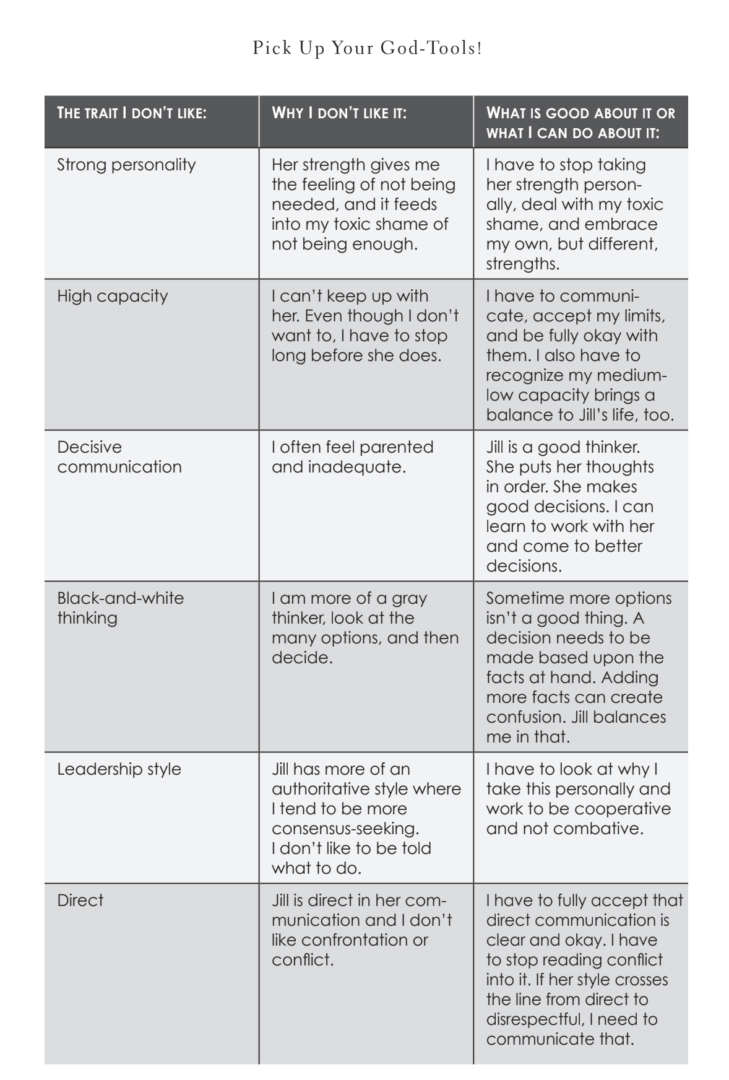 Mark: I didn’t realize coming into marriage how much idealism and unrealistic expectations drove my everyday thinking and perspective. When my expectations weren’t met, my “slow fade of unrealistic expectations” led to disappointment and discouragement. For years I harbored these feelings, which, unaddressed, moved me into disillusionment and finally detachment. Detachment is ultimately what created the internal permission I gave myself to leave my marriage back in 2012. I didn’t realize how much I was detaching in my heart and mind.
Mark: I didn’t realize coming into marriage how much idealism and unrealistic expectations drove my everyday thinking and perspective. When my expectations weren’t met, my “slow fade of unrealistic expectations” led to disappointment and discouragement. For years I harbored these feelings, which, unaddressed, moved me into disillusionment and finally detachment. Detachment is ultimately what created the internal permission I gave myself to leave my marriage back in 2012. I didn’t realize how much I was detaching in my heart and mind.
Jill: For me, my unrealistic expectations were more about my husband in general. I expected him to think more like me. I expected him to see things logically, as I did. If I’m fully honest, I thought my way was the right way and his way was the wrong way. So I expected him at some point to see the error of his ways. Can you relate?
Mark: Expectations fall into several categories, including unknown, unspoken, unrealistic, and unmet. The more we recognize our expectations, the better we can address them.
Jill: Have you experienced disappointment or unmet expectations in your marriage? When we hold onto these things in our hearts, resentment can begin to fester. When that happens, we start to feel disconnected from our spouse which leads to us feeling disillusioned. We can even feel “at war” with our spouse in many ways, and our spouse is often completely unaware this is going on.
Mark: If you’ve listened to our podcast or heard us speak before, you know we believe attachment theory is very important in marriage. We even had Milan and Kay Yerkovich, co-authors and speakers on the topic of attachment and Love Styles, join us on our podcast to speak on this very topic! You can check out that episode if you missed it here.
Jill: If you’re familiar with attachment theory, resentment issues are often more of an issue with anxious attachment styles. People with the Vacillator or Pleaser Love Styles more often have these expectations as well. These personality types and attachment styles have a tendency to operate in a more emotional way and imagine in their mind about what the perfect connection would look like within their relationships. However, real life can’t measure up to that perfect world and they are usually disappointed.
Mark: I’m a feeler. I process life through my emotions. I’m an external processor, which means I need to talk things out. I’m also a “medium-capacity” person—I wear out faster than Jill. And then there’s the idealist in me. I dream—a lot.
Jill: I’m a thinker. I process life logically. I’m an internal processor, which means I think about things—a lot. I’m a high-capacity, fiercely-loyal person. I stay in the game no matter what. And I’m a realist. I’m quick to figure out the illogical side of dreams.
Mark: If we’re not careful, these differences can divide us. Instead of holding onto that resentment and unmet expectations to further divide you and your spouse, it’s important to release those feelings and redirect your energy to draw closer to your spouse.
Jill: To help you shift from resentment to connection, here are four places to start:
1. Accept and Reframe
Mark: The best place to start with connection is acceptance. Every one of us has a core need to belong. Acceptance can seem pretty easy when you are dating but when you move into marriage, acceptance gets harder and harder as we bump into the differences we have with our spouse.
Jill: Mark and I had quite the learning curve when it came to acceptance. I would often want Mark’s brain to work just like mine. When it didn’t, my tendency was to criticize or try to change him. When I did that, I was not accepting him for who he was and how God made him to be. I needed to use the God tool of acceptance.
Mark: What Jill and I both learned is that our imperfections serve to teach one another about love, grace, forgiveness, and all the other things God gives us to deal with this imperfect world. There is actually so much good we can find in our differences that we will never see if we fail to take the time to accept and reframe them. Take a closer look at this chart on traits our spouse may have and how we can reframe it. What would this chart look like if you filled it out for your spouse?
2. Adjust Your Expectations to Better Match Reality
Jill: When we feel resentment start to build as a result of unmet expectations, it’s important that we pause and bring ourselves back to reality. When there is a space between our expectations and our reality, we will experience discontentment.
Mark: It’s true. However, here’s the beautiful thing: We can actually push our thoughts in the right direction to bring our expectations more in line with our reality.
Jill: We do this by refusing to give energy to the negative thoughts we have about our spouse and feeding the positive perspectives we can hold about our spouse. By paying attention to the thoughts you’re having about your spouse, when a negative thought enters your mind you can flip it on its head to turn it into a positive one.
Mark: For instance, when your spouse loads the dishwasher the “wrong way,” take the time to catch that thought and replace it with this reality: I have a spouse who takes the initiative to pitch in on shared chores and takes care of the dishes so I don’t have to.
Jill: If you start to practice this, you’ll be amazed at how your discontentment starts to disappear as you move your expectations to better match reality.
3. Clean Up Your Heart With Forgiveness
Mark: Before we bring our disappointments, resentment, and feelings to our spouse, we need to do the personal work of forgiveness. We need to clean up our own heart and mind first. From a place of forgiveness, we can bring up the actions that hurt us so our spouse can be aware of any behaviors or actions that need to change. (More on that in the next point!)
Jill: Sometimes we also just need to give our spouse grace instead of forgiveness. Forgiveness is a process meant when your spouse has hurt you, even if it was unintentional, and grace is about giving them the “grace space” to be human and make mistakes.
Mark: When your spouse disappoints you, you first need to look inward and use forgiveness to clean up any mess in your heart and disappointments you may be holding against them. When we do this important work of forgiveness, we are free from being controlled by our emotions, and we have room in our heart to experience renewed connection with them.
4. Have a Safe Conversation
Jill: Just because we’ve done the internal work of forgiveness doesn’t mean there still aren’t things we need to address with our spouse.
Mark: That’s right. There are still things you need to address as a couple as part of this process. The best way to begin a conversation safely is by starting with the good things. Share with your spouse what you appreciate about them or something they did well that meant a lot to you.
Jill: After you’ve done that, share with your spouse what would help you feel more seen and connected in your relationship. It’s important to remember that you are not complaining, but rather you are bringing your spouse into your inner life. One way to do this is to use more “I” statements than “you” statements. For example, you might say, “I often start to feel frustrated when you sit on the couch after dinner. I would feel very loved and connected to you if you joined me in cleaning up.” This is much more productive than saying, “You always ignore my needs after we eat dinner. You don’t clean up!”
Mark: The best way to determine if you are complaining is to first do steps one, two, and three to address your own heart and expectations. Want to know even more about how to have a safe conversation? Check out our article on the topic here.
Jill: We certainly didn’t learn these things overnight, nor do we do them perfectly every time now. Letting go of resentment in our relationship and increasing connection takes practice and constant work. By identifying the areas we need to grow personally, we are able to keep responding to each other in a more loving and connecting way in the day-to-day of life.
Which point stands out most to you? Let us know in the comments!
********
Do you need to rebuild trust?
Learn how through our free Rebuilding Trust webinar!















This email came at the best time in my morning. I need to have a conversation with my spouse and am very scared to do so because I know how he will react to the things I need to share. All these steps are a great help to me, especially step 4. Thank you both for all you do for couples struggling in their marriages.
You’re very welcome Kelly!